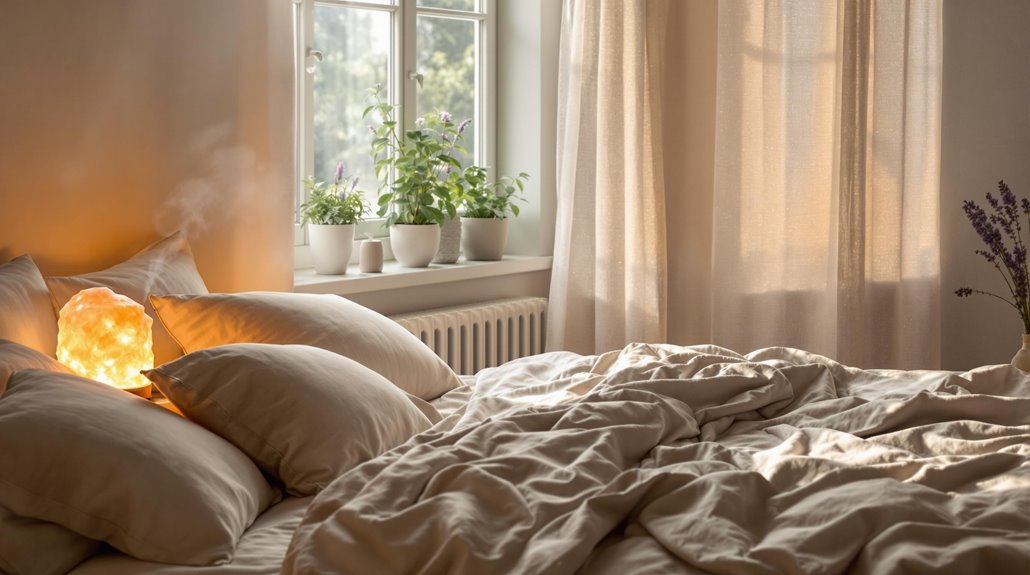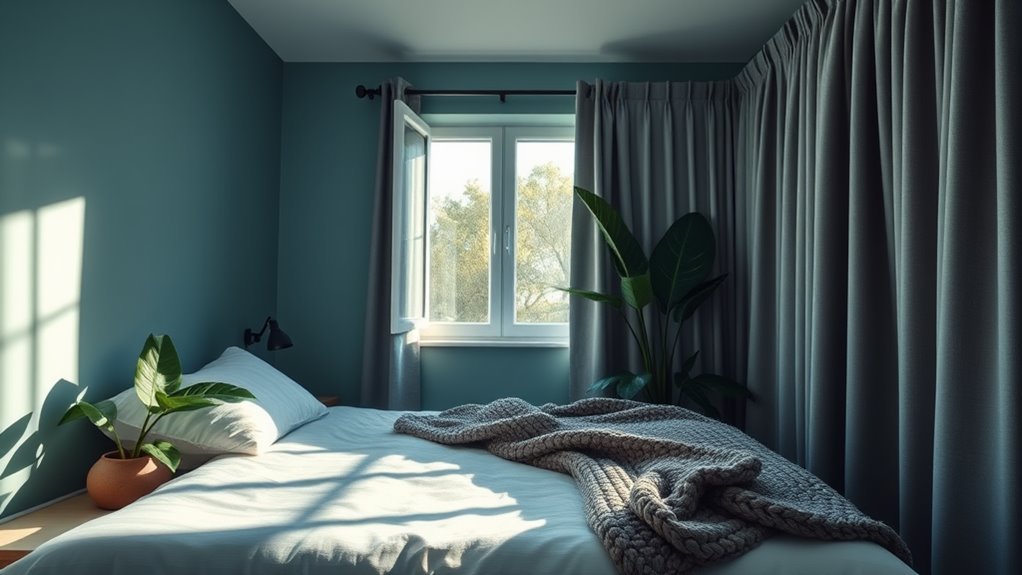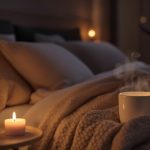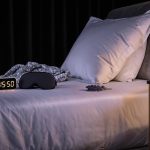
To improve your sleep hygiene naturally, start by maintaining a consistent sleep schedule to better your mental and physical health. Embrace relaxation techniques such as deep breathing and guided meditation. Create a sleep-friendly bedroom, free of clutter, with cool temperatures and minimal light. Monitor your diet, avoiding heavy meals and caffeine near bedtime. Daytime exercise can elevate your mood and enhance sleep quality. Limit light exposure at night by dimming lights and removing electronics an hour before bed. Consider melatonin supplements and explore the soothing effects of lavender essential oil. There’s more to explore for achieving your best sleep.
Maintain a Consistent Schedule
When it comes to achieving better sleep, maintaining a consistent schedule can make all the difference. You’re not just setting a routine to confine yourself; instead, you’re liberating your body and mind, allowing them to flourish. By establishing sleep rituals and sticking to regular wake-up cues, you’re granting your body the stability it craves, which can lead to heightened mental and physical health. Irregular patterns can wreak havoc, leading to negative health outcomes like obesity and cardiovascular issues. But when you adhere to consistent sleep and waking times, you’re enhancing your mood, improving focus, and boosting productivity. A regular sleep schedule supports cellular repair and aligns metabolic processes, contributing to overall health. Incorporating exercise and movement into your daily routine can further enhance sleep quality by reducing stress and improving overall wellness. Think of it as programming your body to expect relaxation and activity at set times, making sleep disruptions a thing of the past. Adjusting your schedule gradually, rather than suddenly, can prevent chaos in your rhythm, and if life throws a curveball, bouncing back to your routine swiftly is essential. Whether you’re a night owl or early bird, respecting your unique circadian rhythm while maintaining this consistency is vital. Embrace this structure, not as a burden, but as your path to liberation from fatigue and stress.
Embrace Relaxation Techniques
Embrace Relaxation Techniques
Frequently, adopting relaxation techniques before bedtime can greatly improve your sleep quality. Deep breathing methods like diaphragmatic breathing and the 4-7-8 technique liberate your mind from stress, promoting tranquillity. Embrace muscle relaxation by practicing Progressive Muscle Relaxation (PMR), which eases tension as you clench and release each muscle group. This not only loosens your body but gives your restless mind a well-deserved peace. Non-Sleep Deep Rest (NSDR) involves guided meditations or deep relaxation exercises that help promote relaxation without the need for sleep, ultimately enhancing energy restoration and relaxation benefits.
Progressive Muscle Relaxation can be more effective when you incorporate deep breathing, aligning body relaxation with mental calmness.
Guided meditation and visualization techniques embrace your imaginative spirit to whisk you to serene mental landscapes. Explore non sleep deep rest or hypnosis benefits to investigate a state of mindful relaxation. Music therapy will serenade you into a restful night, liberating you from the day’s chaos. Set yourself free by blending these techniques for a holistic approach to sleep.
Create a Sleep-Friendly Bedroom

Crafting a sleep-friendly bedroom involves creating an environment conducive to rest by enhancing various elements. Start with bedroom organization; a clutter-free space liberates your mind from chaos. Use efficient storage like underbed drawers to keep unnecessary items tucked away. Reducing clutter directly reduces stress, freeing you from the constraints of a disordered room.
Consider color psychology when designing your space. Cool color tones like soft blues and greens promote tranquility and relaxation, setting a calming foundation for sleep. Dimming your lights and employing blackout window shades keeps intrusive light at bay, essential for undisturbed slumber. Ensure that you maintain a consistent sleep schedule, as it aids in anxiety management and contributes to better sleep hygiene.
Controlling the room’s temperature between 60°F and 72°F with adjustable fans or an AC unit aligns your body for ideal rest. This optimal temperature range helps regulate melatonin release, which is vital for a serene night’s sleep. Enhance comfort with moisture-wicking bedding materials—bamboo or linen—so you stay cool and cocooned as you drift off.
White noise machines or earplugs can drown out disruptive sounds, giving you the silence needed for a deep night’s sleep. Finally, harness the calming properties of essential oils like lavender for an aromatic haven, stimulating your senses to unwind, freeing your spirit from daytime strains.
Monitor Diet and Nutrition
With a well-optimized bedroom setting the stage for restful sleep, attention now turns to the nutritional choices that support nightly rejuvenation. The way you fuel your body impacts sleep quality, and making thoughtful dietary adjustments can set you free from restless nights.
- Balance your nutrient timing: Eating complex carbohydrates like oatmeal well before sleep helps release serotonin, paving the path for relaxation. Schedule meals to stabilize hunger hormones and avoid overeating, which is liberating for both mind and body.
- Hydration balance: Staying properly hydrated throughout the day is essential. However, limiting fluid intake right before bedtime helps avoid nocturnal awakenings that disrupt your sleep sanctuary. Incorporating an adequate amount of protein in your diet can also contribute to a feeling of fullness and aid in sleep quality.
- Embrace sleep-promoting foods: Incorporate magnesium-rich foods such as spinach and avocados, alongside tryptophan-rich sources like turkey and nuts, to enhance serotonin and melatonin production naturally. Whole foods over processed options are key for better sleep, emphasizing the importance of a balanced diet.
- Avoid sleep disruptors: Steer clear of high-sugar and high-fat foods, caffeine, and alcohol near bedtime. These can reduce serotonin levels and cause inflammation, shackling your potential for a peaceful night.
Breaking free from poor sleep patterns requires clarity in dietary choices. Adopting a Mediterranean diet, rich in diverse nutrients and paired with conscious nutrient timing and hydration balance, empowers you to reclaim your restful nights.
Incorporate Daytime Exercise

Engaging in daytime exercise paves the way to better sleep by enhancing both sleep quality and efficiency. Immerse yourself in moderate aerobic routines like cardio or running, or opt for resistance exercises such as weightlifting. These exercise types can transform your nights by increasing deep, slow-wave sleep and reducing disorder symptoms.
Picture your evenings ushered in by the calming effects of yoga or light stretching. Such activities lessen stress, crafting a serene shift into dreamland.
When it comes to exercise timing, tune into your body’s natural rhythm. A morning jog or afternoon gym session revs up your melatonin levels, aligning your sleep-wake cycle harmoniously with the natural world.
Introducing regular exercise also has the unexpected benefit of immune system strengthening, reducing your risk of chronic diseases and enhancing your overall well-being.
Remember, exercising too close to bedtime might backfire by keeping you awake. Aim for at least 30 minutes of exercise, but feel free to break it up throughout your day to suit your unique schedule.
Not only does this elevate your mood, but it also crushes stress, paving the way for restful nights. Exercise liberates your spirit, refines your mood, and motivates you for stellar sleep hygiene.
Embrace consistency, and let your newfound routine melt away sleep disorders and revitalize your health.
Limit Light Exposure at Night
Someone who struggles with sleep mightn’t realize how much night-time light exposure can sabotage their rest. Light pollution, especially from electronic devices, disrupts your body’s natural rhythm.
You’re meant to power down and let darkness cue those essential sleep signals. Unfortunately, blue light stands in the way, suppressing melatonin production, a hormone needed for quality sleep.
Here’s how you can limit light exposure and reclaim your nights:
- Dim Your Environment: Embrace your sleep by dimming or turning off lights an hour before bed. Let subtlety be your liberation path—prepare your mind and body for the rest it craves.
- Banish Electronics: Electronic gadgets are the culprits of evening light invasion. Keep them out of the bedroom or, better yet, power them down well before bedtime to let natural processes take over.
- Blue Light Glasses: While you may love your nightly screen time, use blue light-blocking glasses. They shield you from the harsh impact on melatonin levels.
- Curtain it Down: Invest in blackout curtains to combat external light pollution. By doing so, you create a dark sanctuary that fosters sleep’s embrace.
With these changes, you’re free to embrace the natural ebb of restful nights.
Explore Melatonin Supports

Considering the struggles many face with getting a good night’s sleep, exploring melatonin supports can be a game changer. Melatonin, a hormone produced by your brain in response to darkness, helps regulate the sleep-wake cycle. When the natural production is insufficient, synthetic supplements can offer a liberating path to better sleep.
The melatonin benefits are abundant: it assists with sleep onset, combats insomnia, and even reduces jet lag, making it especially helpful for travelers or those with irregular schedules. It’s important, however, to pay attention to melatonin timing. For best results, take a dosage of 1 to 5 milligrams around 30 minutes before bedtime.
Embracing melatonin requires a degree of caution. It’s generally safe for short-term use but be aware of potential interactions, such as with blood-thinning medications. Always start with the lowest dose and gradually increase if necessary.
Remember to avoid operating machinery or driving within five hours of taking it, as drowsiness can occur. This mindful approach not only promotes a restful night but also empowers you to take control of your sleep patterns and live a more energized life.
Before starting any supplement, it’s wise to consult with a healthcare provider.
Try Lavender Essential Oil
The science and tradition behind improved sleep hygiene reveal that even small adjustments can make a significant difference in the quality of your rest. Amongst the array of sleep aids, lavender essential oil stands out due to its multifaceted benefits that not only soothe the mind but also rejuvenate the body.
Lavender oil’s ability to promote deep sleep, alleviate stress, and act as a natural relaxant makes it a highly effective remedy for achieving better sleep. Its versatility allows use across various age groups, enhancing sleep routines without the risks associated with pharmaceutical alternatives. This makes lavender essential oil a commendable choice for anyone seeking to enrich their sleep hygiene practices.
In exploring better sleep hygiene, lavender essential oil emerges as an indispensable tool. This natural remedy’s effectiveness lies in its capacity to increase slow-wave sleep, vital for restorative rest.
Its interaction with neurotransmitters like GABA permits it to reduce anxiety and stress levels, creating a sense of calm and well-being conducive to sleep. Furthermore, studies confirm its ability to improve sleep quality across demographics, including insomnia sufferers and the elderly, underscoring its universal appeal.
Using lavender oil can be as simple as diffusing it in your bedroom or incorporating it into a nightly skincare routine. Whether adding a few drops to a bath or combining it with other calming oils, the key is consistency.
As with any remedy, it’s important to follow precautions, ensuring proper dilution and consulting with healthcare professionals when necessary. Through these approaches, lavender oil not only enhances sleep quality but also enriches overall cognitive and emotional health, making it a fundamental component of a holistic approach to better sleep hygiene.














